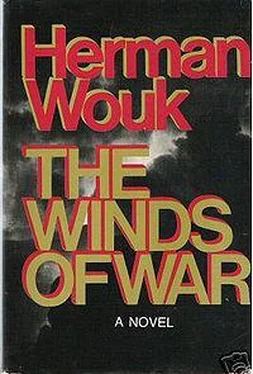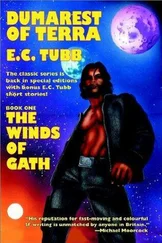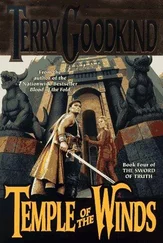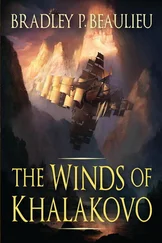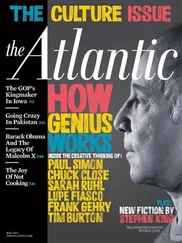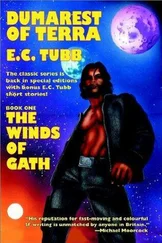Herman Wouk - The Winds of War
Здесь есть возможность читать онлайн «Herman Wouk - The Winds of War» весь текст электронной книги совершенно бесплатно (целиком полную версию без сокращений). В некоторых случаях можно слушать аудио, скачать через торрент в формате fb2 и присутствует краткое содержание. Год выпуска: 1971, Издательство: Collins, Жанр: Историческая проза, на английском языке. Описание произведения, (предисловие) а так же отзывы посетителей доступны на портале библиотеки ЛибКат.
- Название:The Winds of War
- Автор:
- Издательство:Collins
- Жанр:
- Год:1971
- ISBN:нет данных
- Рейтинг книги:4 / 5. Голосов: 1
-
Избранное:Добавить в избранное
- Отзывы:
-
Ваша оценка:
- 80
- 1
- 2
- 3
- 4
- 5
The Winds of War: краткое содержание, описание и аннотация
Предлагаем к чтению аннотацию, описание, краткое содержание или предисловие (зависит от того, что написал сам автор книги «The Winds of War»). Если вы не нашли необходимую информацию о книге — напишите в комментариях, мы постараемся отыскать её.
About the Author
Herman Wouk's acclaimed novels include the Pulitzer-Prize winning
;
;
;
;
;
; and
.
The Winds of War — читать онлайн бесплатно полную книгу (весь текст) целиком
Ниже представлен текст книги, разбитый по страницам. Система сохранения места последней прочитанной страницы, позволяет с удобством читать онлайн бесплатно книгу «The Winds of War», без необходимости каждый раз заново искать на чём Вы остановились. Поставьте закладку, и сможете в любой момент перейти на страницу, на которой закончили чтение.
Интервал:
Закладка:
“Oh, for Pete’s sake , Aaron—”
“Just a moment, now! Lenin was all prudence and caution in foreign affairs, and that is my whole point. Glory, and honor, and all those tinselly illusions of the old system that led to wars, were to Lenin the merest eyewash. So it is to Hitler. He has never moved when he couldn’t get away with it. The outlaw running wild with a gun is the exact effect he wishes to create. I’m surprised that you’re taken in. He is really a very, very prudent man. If he can make it in Poland without war, he’ll do it. Otherwise he’ll not move. Not now. Perhaps in ten years, when he’s built Germany up enough. I shall be very content to live another ten years.”
Slote pulled at his moustache with lean nervous fingers. “You really lose me, Aaron. Can you be serious? Hitler a Leninist! That’s a coffeehouse paradox, and you know it. The Russian Revolution is a radical change in history. The abolition of private property has created a new world. You may like it or detest it, but it’s new. Hitler’s socialism was a sham to get a mob of gangsters into power. He’s frozen the German economy just as it was, smashed the labor unions, lengthened the working hours, cut the pay, and kept all the old rich crowd on top, the Krupps and Thyssens, the men who gave him the money to run for office. The big Nazis live like barons, like sultans. The concentration camps are for anybody who still wants the socialist part of National Socialism. Don’t you know that? The 1934 purge was nothing but a showdown between the socialist element of the Nazi Party, and the army generals and rich conservatives. Hitler shot his old Party friends like partridges. That you rely on this man’s prudence for your safety, and for Natalie’s, strikes me as grotesque.”
“Does it?” Jastrow glanced at his watch and sighed. “I’m sorry. I’m impressed with Hitler’s ability to use socialist prattle when necessary, and then discard it. He uses doctrines as he uses money, to get things done. They’re expendable. He uses racism because that’s the pure distillate of German romantic egotism, just as Lenin used utopian Marxism because it appealed to Russia’s messianic streak. Hitler means to hammer out a united Europe. If a nonsense jumble of racist bunkum, socialist promises, brass bands, parades, uniforms, and weepy songs is what welds Germans into a blunt instrument, he gives them that. The Germans are stolid, clever, brutal, and docile, and they will vigorously execute any command barked at them with a loud enough voice. He understands them, and he may just succeed. A unified Europe must come. The medieval jigsaw of nations is obsolete. The balance of power is dangerous foolishness in the industrial age. It must all be thrown out. Somebody has to be ruthless enough to do it, since the peoples with their ancient hatreds will never do it themselves. It’s only Napoleon’s original vision, but he was a century ahead of his time. The old crowd was still strong enough to catch and put him in a crate to die. But there’s nobody to cage Hitler.”
Byron blurted, “Dr. Jastrow, when I was in Germany I saw the signs on park benches and in trolley cars about the Jews. I saw burnt-out synagogues.”
“Yes?”
They all looked at him. He went on, “I’m surprised you talk as calmly about Hitler as you do. Being Jewish, I mean.”
Dr. Jastrow smiled a slow, acid smile, showing little yellowish teeth with one gold crown. He stroked his beard and spoke deliberately, the classroom note strong. “Well! Your surprise doesn’t surprise me. Young people — young Americans especially — aren’t aware that the tolerance for Jews in Europe is only fifty to a hundred years old and that it’s never gone deep. It didn’t touch Poland, where I was born. Even in the west — what about the Dreyfus case? No, no. In that respect Hitler represents only a return to normalcy for Europe, after the brief glow of liberalism. The hostility simply moved from the church to the anti-Semitic parties, because the French Revolution changed Europe from a religious to a political continent. If Hitler does win out, the Jews will fall back to the second-class status they always had under the kings and the popes. Well, we survived seventeen centuries of that. We have a lot of wisdom and doctrine for coping with it.”
Slote shook his head. “You love to spin such talk, I know, but I wish you would do it on the next boat home.”
“But I’m quite serious, Leslie,” Jastrow said with a faintly puckish smile. “You rang wild alarms when Mussolini passed the anti-Jewish laws. They proved a joke.”
“They’re on the books, if the Germans ever press him to use them.”
“The Italians loathe and fear the Germans to a man. Even if by some mischance there is a war, Italy won’t fight. Siena may well be as safe a place as any.”
“I doubt that Natalie’s parents think so.”
“She can go home tomorrow. Perhaps she finds Siena slightly more attractive than Miami Beach.”
“I’m thinking of going,” the girl said. “But not because I’m afraid of war or of Hitler. There are things that bother me more.”
“I daresay,” Jastrow said.
Slote’s face turned astonishingly red. His pipe lay smoking on an ashtray, and he was playing with a yellow pencil he had taken from a pocket, turning it in one fist. The pencil stopped turning.
Jastrow stood. “Byron, come along.”
They left the girl and the scarlet-faced man at the table, glowering at each other.
Books filled the shelves of a small wood-panelled library, and stood in piles on the desk and on the floor. Over a marble fireplace a stiff Sienese madonna and child hung, blue and pink on gold; a tiny painting in a large gilded frame. “Berenson says it’s a Duccio,” Jastrow observed, with a little wave at the painting, “and that’s enough for me. It’s not authenticated. Now then. You sit there, in the light, so that I can see you. Just put those magazines on the floor. Good. Is that a comfortable chair? Fine.” He sighed and laid a thumb against his lower lip. “Now, Byron, why didn’t you go to the Naval Academy? Aren’t you proud of your father?”
Byron sat up in his chair. “I think my father may be Chief of Naval Operations one day.”
“Isn’t he worth emulating?”
“My brother Warren’s doing that. I’m just not interested.”
“Dr. Milano wrote that you took a naval reserve course and obtained a commission.”
“It made my father feel good.”
“And you’ve had no second thoughts about the Navy? It’s not too late yet.”
Byron shook his head, smiling. Jastrow lit a cigarette, studying Byron’s face. The young man said, “Do you really like living in Italy, sir?”
“Well, I was ordered to a warm climate. I did first visit Florida, Arizona, southern California, and the French Riviera.” The professor spoke these place-names with an irony that wrote them off, one by one, as ridiculous or disagreeable. “Italy is beautiful, quiet, and cheap.”
“You don’t mind making your home in a Fascist country?”
Jastrow’s smile was indulgent. “There are good and bad things in all political systems.”
“How did you ever come to write A Jew’s Jesus , sir? Did you write it here?”
“Oh, no, but it got me here.” Jastrow spoke somewhat smugly. “I was using the Bible in a course on ancient history, you see. And as a boy in Poland I’d been a Talmud scholar, so in teaching the New Testament I tended to stress the rabbinic sources that Jesus and Paul used. This novelty seemed to fascinate Yale juniors. I cobbled up a book, with the working title Talmudic Themes in Early Christianity , and then at the last minute I thought of A Jew’s Jesus . The Book-of-the-Month Club selected it.” Jastrow made a soft gesture with both hands all around the room, smiling. “And here I am. The club payment bought this place. Now then, Byron, what are your plans? Are you going to return to the United States?”
Читать дальшеИнтервал:
Закладка:
Похожие книги на «The Winds of War»
Представляем Вашему вниманию похожие книги на «The Winds of War» списком для выбора. Мы отобрали схожую по названию и смыслу литературу в надежде предоставить читателям больше вариантов отыскать новые, интересные, ещё непрочитанные произведения.
Обсуждение, отзывы о книге «The Winds of War» и просто собственные мнения читателей. Оставьте ваши комментарии, напишите, что Вы думаете о произведении, его смысле или главных героях. Укажите что конкретно понравилось, а что нет, и почему Вы так считаете.
